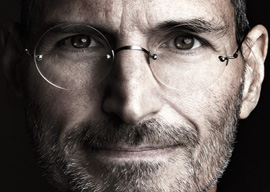
October 11, 2011

Steve Jobs
In today’s world, there’s an increasing obsession with money: who has it, who doesn’t, who should get it, who deserves it. We have a president and much of government preoccupied well beyond their job descriptions with how much money certain people or certain groups possess, while they’re fixated on setting themselves up as arbiters and distributors of this money. The young, overeducated, middle- and upper-middle-class protestors found in Lower Manhattan, Great Britain, and elsewhere are obsessed with money, and they no longer represent a fringe societal element. They don’t think they have enough, and they want more from whomever they view as possessing an adequate amount, regardless of its creation through work or inherent value. They’ve been taught someone else should pay for their (inflated) education, their healthcare, their transportation, their living domain, and their mere existence on planet Earth. One begins to wonder how meaningful the cry for “jobs” is when an increasing number of people expect to receive to money just for being alive.
It used to be considered bad form to publicly discuss one’s income level. These days our government and many in the population it serves (or services) freely throw around income levels, judging you worthy or not worthy of possessing a certain amount of money regardless of what you’ve done to earn it, what your goals and responsibilities are, or what your cost of living is. Rather than money being a tool (as in investment) or a unit of freedom (as in spending on travel) or a reward (as in payment for a service rendered), it’s being used as a measure in and of itself. Money is treated as an objective and as an object that can be quantified and then judged as too little or too much.
What’s lost are the tangibles and intangibles that go into producing value and worth rather than money. It’s like a sum without an equation.
Steve Jobs didn’t produce money. He followed his instincts, did what he did well, applied what he learned, and worked his tail off doing it, falling along the way, getting up again, and pressing on. He created products people lined up around the block to buy. As a result, he created wealth and value, which objectifies itself in the form of money.
This is the lesson today’s young people should take from Steve Jobs as they praise him with devices he created using the capitalist system: Do what you love. Do it well.
The money will come.